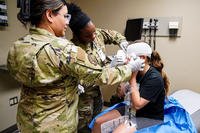- Cover Letters
- Jobs I've Applied To
- Saved Searches
- Subscriptions
- Marine Corps
- Coast Guard
- Space Force
- Military Podcasts
- Benefits Home
- Military Pay and Money
- Veteran Health Care
- VA eBenefits
- Veteran Job Search
- Military Skills Translator
- Upload Your Resume
- Veteran Employment Project
- Vet Friendly Employers
- Career Advice
- Military Life Home
- Military Trivia Game
- Veterans Day
- Spouse & Family
- Military History
- Discounts Home
- Featured Discounts
- Veterans Day Restaurant Discounts
- Electronics
- Join the Military Home
- Contact a Recruiter
- Military Fitness

Air Force Program Allows Humanitarian Assignments in Time of Need

An Air Force reassignment program might be able to help airmen whose families are experiencing a long distance crises. If they qualify, those troops can use the program for an extra military move or to stay at their current location.
The Humanitarian Reassignment and Deferment Program, run by the Air Force Personnel Center, assists active-duty airmen in resolving severe, short-term problems involving a family member while airmen continue to meet the needs of the Air Force.
"The spirit and intent of the program is to place the airman at the closest location to where the problem exists," said Kimberly Schuler, Humanitarian Assignment Policy chief. "Typically, a reassignment or deferment is a one-time action to resolve a critical problem with a family member within a reasonable period of time, normally 12 months."
The definition of "family member" for the Humanitarian Program is limited to spouse ; child; parents, to include in-laws and stepparents; person in loco parentis; or other persons actually residing in the household who are dependent on the airman for more than half of their financial support.
"We often get asked about siblings," Schuler said. "That's always a tough one because siblings aren't within the scope of the definition of 'family member.' However, if the sibling is terminally ill, we'll look at the request as an exception to policy."
In a case that requires a long-term solution, an airman would have to look at other options, she said.
"The Humanitarian Program is a temporary solution to a short-term problem and the Air Force is unable to consider a permanent or prolonged deferment."
The comptroller general has ruled that the Air Force cannot make moves at government expense based solely on humanitarian reasons. The reassignment or deferment must be to meet Air Force mission needs in addition to helping the airman. Therefore, a valid vacancy must exist at the gaining base and the airman must meet retainability requirements for a permanent change of station .
Schuler's team in AFPC's Military Assignment Programs Branch, along with a team of six case managers in the Assignment Support Section and 11 Total Force Service Center Assignment technicians processes approximately 1,000 requests annually to expedite assistance to airmen in need.
Humanitarian reassignment or deferment is not limited to a single reason. Circumstances can include the terminal illness of a family member, the death of an airman's spouse or child, the sexual assault of the airman's spouse or child, or issues involving a serious financial impact such as the loss of property through fire or natural disaster.
"The reason doesn't have to fit into a box," Schuler said.
In each situation, the AFPC Medical Review Board or the AFPC Administrative Law Office reviews requests for verification of clinical data submitted with an application or for the verification of legal documentation. Careful consideration goes into the adjudication of each request, as these airmen are normally in a crisis and deserve the most compassionate eyes possible on their situation.
"It's not just personnelists making the decision," Schuler said. "It's a whole system of checks and balances. The entire team looks at the whole-person concept. We look at each situation as if we were in that airman's shoes and view the circumstances with empathy and kindness."
Missing documentation can delay the process, which is normally about two to four weeks. Schuler said the more supporting documentation the airman can provide about every aspect of the situation, the better, as it paints a clearer picture of the scope of the problem. Burden of proof is on the member to prove that their situation is more than what an average airman is going through.
"Everyone has a tipping point, so we weigh everything--everything--happening in that airman's life to determine the best course of action," she said.
Currently, 2,916 airmen are directly benefiting from humanitarian assignments at bases across the Air Force. However, if the airman's application does not meet the threshold for an approval under the Humanitarian Program, the case managers take the extra step to research if the airman may be eligible for another alternative assignment option.
"Perhaps the airman can apply for a Base of Preference or a follow-on assignment," Schuler said. "Or maybe they don't meet the requirements right now, but if something changes, they can reapply. We try to manage their expectations and provide resources instead of just simply saying, 'Denied.'"
Schuler's team is also working on improvements to the application process to make it more intuitive. Two efficiencies they would like to implement include a "delivery" status bar, visible to customers in the virtual Military Personnel Flight, and a defined set of statuses with detailed explanations of the application process.
To help airmen navigate those resources, Schuler's team hosts recurring webcasts on the Humanitarian Reassignment and Deferment Program. The next webinar for all airman is scheduled for Sept. 27, 2017 at 8 a.m. and 4:30 p.m. Central Daylight Time.
Additionally, airmen can chat with a personnel specialist live on myPers about the humanitarian program between the hours of 7 a.m. to 5 p.m. CDT. To access the chat feature, click on the Humanitarian/EFMP link under "Assignment Programs" on the active-duty myPers Assignment landing page, hover the mouse cursor for 30 seconds and a chat window will appear.
For more information about Air Force personnel programs, visit myPers . Individuals who do not have a myPers account can request one by following the instructions on the Air Force's Personnel Center website.
Military.com contributed to this article.
You May Also Like

The Air Force has reached an agreement with the Environmental Protection Agency to address contaminated drinking water in...

Right now, Tricare will cover IVF and other assisted reproductive technologies only if the infertility was caused by a...

The limitations are needed, Tricare officials said, to ensure a smooth transition for patients changing health care companies...

The incident occurred Nov. 17 when the maintainer was operating an MJ-1 vehicle, called a "jammer," as crew members were...
- Benefits Directory
- Active Duty
- Benefits for Retirees
- Veteran Benefits
- Military Spouse & Family
- Reserve & Guard
- Military Benefits Open Enrollment
Select Service
- National Guard
VA Loans and Homebuying
- Confusion, Misinformation and the VA Loan
- Veterans Buying Homes with VA Loans May Have to Pay Their Own Real Estate Agents
- Veterans at Risk of Losing Homes Could Get More Time as VA Urges Extended Pause on Foreclosures
- VA Introduces New 'Last Resort' Loan Program to Help Roughly 40,000 Veterans Keep Their Homes
- VA Pauses Foreclosures on Veterans Facing Difficulties Making Mortgage Payments

Most Popular Military Pay Articles

In a move aimed at supporting service members during prolonged deployments, Army Secretary Wormuth announced that soldiers...

Here are four themes driving service members' decision not to contribute to the military's Thrift Savings Plan and why I...

Marines reenlisting between now and the end of September 2025 are eligible to receive the bonuses, but all the cash awards...

From deployments to frequent moves and everything in between, the military experience doesn't always directly match the...

The pay bump was due to begin next Tuesday, but Army officials said that all the details of the bonus had never been sorted...

Veteran Benefits Updates
- Alabama Governor Dismisses Head of Department of Veterans Affairs After Agency Board Refuses
- Harris Endorses Proposal to Expedite Veterans Benefits for PFAS-Related Illnesses
- VA Must Start Building 750 Temporary Units for Homeless Vets on Los Angeles Land, Judge Says
- Canceled Appointments, Unexplained Mixups – Veterans Facing Challenges Getting VA Mental Health Care
- Supreme Court Weighs Arguments in Lawsuit over Veterans Getting 'Benefit of Doubt' in Claims Decisions
- Career Paths
- US Military Careers
Air Force Humanitarian Assignments
- Technology Careers
- Sports Careers
- Project Management
- Professional Writer
- Music Careers
- Legal Careers
- Government Careers
- Finance Careers
- Fiction Writing Careers
- Entertainment Careers
- Criminology Careers
- Book Publishing
- Animal Careers
- Advertising
Rod Powers was a retired Air Force First Sergeant with 22 years of active duty service.
- Air Force NCO Academy
The Air Force Humanitarian Assignments Program was established to assist members in resolving severe short-term problems involving a family member. The program allows placement of the military member at the closest location to where the family member concerned resides to provide the family member maximum support, consistent with the manning needs of the Air Force.
For the purposes of this program, the term "family member" is limited to spouse, child, father, mother, father-in-law, mother-in-law, the person in loco parentis or other persons actually residing in the household who are dependent for over half of their financial support. Stepparents can qualify as a family member if they meet the basic criteria for in loco parentis.
In loco parentis refers to one who exercises parental rights, duties, and responsibilities. This condition must exist for a minimum of 5 years before the member's or spouse's 21st birthday, or before entry on active duty, whichever is earlier. Requests based on in loco parentis status must include affidavits from all parties (to include other family members, neighbors, or family friends) stating the details of the custody, control, care, and management of member or spouse. They must also have copies of any documents that may have been created at the time establishing in loco parentis status and relating to the custody, control, care, and management of member or spouse. NOTE: The mere presence of a person in the home for a number of years, during which time he or she exercised a degree of custodial but not parental responsibilities does not constitute in loco parentis. In order for the child to have been in the care and custody of one acting in place of the parent, the parent cannot have also been in the same home (unless the parent was mentally incompetent).
Emergency or ordinary leave should be used first as a means of easing family hardships or problems before applying for humanitarian reassignment.
The situation must be able to be resolved in a limited period of time (one year or less). All Air Force personnel must be able to respond to any contingency wherever and whenever called upon to do so. Permanent or prolonged deferment from reassignment cannot be considered. If a reassignment or temporary period of deferment is approved, the member must thereafter (following the deferment period) revert to worldwide assignable status. If the problem cannot be resolved within a year, humanitarian discharge consideration is more appropriate.
Eligibility Criteria
Members can apply for a humanitarian reassignment or deferment if they meet all of the following conditions:
- They have a documented and substantiated short-term problem involving a family member. (See see above for the definition of a family member for the purpose of the humanitarian reassignment program.)
- The problem is more severe than that usually encountered by other Air Force members with a similar problem.
- The member's presence is absolutely essential to alleviate the problem.
- The problem can be resolved within a reasonable period of time (normally 12 months).
Humanitarian Conditions Usually Warranting Approval
The approval authority will normally approve a humanitarian reassignment or deferment under these conditions if a vacancy exists at the new duty station if a PCS is involved ; however, this list is not all-inclusive.
- The recent death (within 6 months) of the member's spouse or child, including miscarriages of 20 weeks or more gestation time. Humanitarian reassignment is normally approved on the death of a child or stepchild under the age of 18 who is living in the member's home at the time of death. Reassignments made under this provision will be considered on a case-by-case basis in order for the member to receive extended family support or to relocate to the closest available base to the burial site. The overall consideration will be the needs of the Air Force; however, every effort will be made to ensure the member is provided an assignment as close to the area of support as possible, within their AFSC.
- The member has a serious financial problem not the result of overextension of personal military income (such as loss of primary home of residence where member or dependents currently reside or possessions through fire, theft, or natural disaster) and will suffer a substantial financial loss unless his or her presence or continued presence can be ensured. It must be shown the problem cannot be solved by leave, correspondence, power of attorney, or by any other person or means.
- The member is serving an unaccompanied OS tour, and his or her spouse abandons their dependents. It must be shown it is not possible for the dependents to join the member at the OS location when an accompanied tour is authorized and that the member's presence is necessary. The assignment location under this provision will be based on the needs of the Air Force.
- The terminal illness of a family member (see paragraph above for definition of family members for the purpose of humanitarian reassignment) when death is imminent within two years. A doctor's prognosis of terminal illness must be fully supported and substantiated by clinical data. In such cases, your presence is considered essential regardless of the availability of other relatives to assist.
- An authorized state or local agency places a child in the member's home, and deferment is necessary to comply with state or local laws to complete the final adoption.
- Reassignment or deferment is essential in establishing or operating an effective family advocacy program according to AFI 40-301, Family Advocacy . Documentation from the base Family Advocacy Officer is required.
- Sexual abuse and assault of the member's dependent when it has been fully substantiated, and it has been determined by the appropriate medical authority that remaining in the area where the incident occurred would be detrimental to the health of the dependent.
Reasons Humanitarian Applications Are Disapproved
The approval authority will not approve applications for reassignment/deferment if the problem might exist for an indefinite period of time or the request is based on one of the following circumstances:
- A desire to provide emotional or domiciliary support to a parent or parent-in-law due to age, non-terminal or chronic illness, or recent death in the family.
- A terminal illness of a step-parent, unless they qualify as a family member (see above definition for the purpose of the humanitarian program.
- Problems associated with childcare arrangements.
- Psychoneurosis (such as various psychic or mental disorders characterized by special combinations of anxieties, compulsions, obsessions, phobias, and motor or sensory manifestations) resulting from family separation incident to military assignment.
- Normal pregnancy, possible miscarriage, breech birth, Cesarean section, or RH blood factor.
- The existence of a housing shortage or home ownership problems.
- A financial problem, to include bankruptcy, resulting from over-extension of military income.
- A financial or management problem related to off-duty employment, the spouse's employment, private business activities, or to settle an estate.
- Passport or visa problems involving newly acquired dependents in the overseas area.
- Threatened separation, a divorce action, or the desire to pursue child custody.
- The problem existed or was reasonably foreseeable at the time of latest entry on active duty without a break in service or prior to departure on PCS. A7.10.12. A consecutive PCS or deferment based on the continuation of the same circumstances.
- A request based on the medical condition of the Air Force member. (Contact the local patient affairs office for information about reassignment based on a military member's medical condition.)
- Requests for PCS deferment will not be considered for members who have not been selected for reassignment.
Assignment/TDY Restrictions
If the Humanitarian Assignment/Deferment is approved, the TDY (Temporary Duty) assignment authorities will not select members for involuntary TDY exceeding 30 calendar days while the deferment is active. If granted a reassignment, members will not be reassigned PCS (permanent change of station) for at least 12 months from date arrived station. A deferment will initially restrict members from PCS or involuntary TDY for a maximum of 12 months. The initial period of assignment restriction for humanitarian reasons may be extended at the member's request provided the total period does not exceed 18 months. If a terminal illness is involved, deferment may be extended up to 24 months. Requests for such extensions must substantiate that:
- Every possible effort has been made to overcome the problem.
- The condition warranting assignment restriction still exists.
- The problem can be resolved within the extended period of assignment restriction.
For complete information about the Air Force's Humanitarian Assignments Program, see. Air Force Instruction 36-2110, ASSIGNMENTS , Attachment 7 offers complete information about the Air Force's Humanitarian Assignments Program.
- Air Force Assignment System
- Military Humanitarian or Compassionate Assignments
- Becoming an Air Force Recruiter
- Air Force Stressed Job Listing
- AFSC 3D0X1 Knowledge Operations Management
- Air Force Pararescue Physical Ability and Stamina Test – PAST
- Career as a USAF Space Systems Operator
- Air Force Permanent Change of Station Assignment Policies
- 1n3X1 - Cryptologic Linguist - Assignment Locations
- AFSC 4Y0X2 - Dental Laboratory Specialist
- Airborne Operations and Battle Management Job Facts
- The Humanitarian Service Medal
- Is the Air Force the Best Branch for Quality of Life?
- What to Know A Career in Air Force 1P0X1 Aircrew Equipment
- Air Force Combat Control (AFSC 1C2X1) Enlisted Job Description
- Air Force Enlisted Jobs: Personnel Specialist
